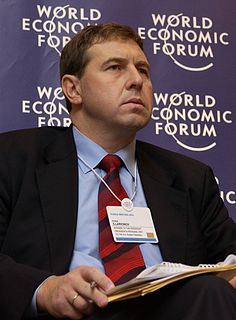A Quote by Michael Meacher
Globally, emissions may have to be reduced, the scientists are telling us, by as much as 60% or 70%, with developed countries likely to have to make even bigger cuts if we're going to allow the developing world to have their share of growing industrial prosperity...The Kyoto Protocol is only the first rather modest step. Much, much deeper emission reductions will be needed in future. The political implications are mind-blowing.
Quote Topics
Allow
Bigger
Blowing
Countries
Cuts
Deeper
Developed
Developed Countries
Developing
Developing World
Emission
Emissions
Even
First
Future
Globally
Going
Growing
Implications
Industrial
Kyoto
Kyoto Protocol
Likely
Make
May
Mind
Mind-Blowing
Modest
Much
Needed
Only
Political
Prosperity
Protocol
Rather
Reduced
Scientists
Share
Step
Telling
Us
Will
World
Related Quotes
The impact of the Kyoto Protocol on global temperature is quite modest, especially for the first century. The reduction in global mean temperature in the Annex I case relative to the reference in 2100 is 0.13ºC; this compares with a difference of 0.17ºC from the Kyoto Protocol calculated by Wigley. The temperature reduction in the optimal run is essentially the same as the Kyoto runs by the 22nd century.
The implications of the transfer of full sovereignty from separate nations to a World Organization. . .Political unification in some sort of World Government will be required. . .Even though. . . any radical eugenic policy will be for many years politically and psychologically impossible, with the greatest care, and that the public mind is informed of the issues at stake so that much that now is unthinkable may at least become thinkable.
A considerable proportion of the developed world's prosperity rests on paying the lowest possible prices for the poor countries' primary products and on exporting high-cost capital and finished goods to those countries. Continuation of this kind of prosperity requires continuation of the relative gap between developed and underdeveloped countries - it means keeping poor people poor. Increasingly, the impoverished masses are understanding that the prosperity of the developed countries and of the privileged minorities in their own countries is founded on their poverty.
People who believe that they are going to be excommunicated and shamed, or whatever other dark things may happen to them, are much less likely to enter open, loving relationships. And they are also much less likely to have the self-esteem that is required to be monogamous and loving. And in consequence, they are much less likely to create families.
Survival means the survival of human kind as a whole, not just a part of it. If the South cannot survive, then the North is going to crumble. If countries of Third World cannot pay their debts, you are going to suffer here in the North. If you do not take care of the Third World, your well-being is not going to last, and you will not be able to continue living in the way you have been much longer. It is leaping out at us already. You cannot leave the job to the governments or the political scientists alone. You have to do it yourself.
The different policies reduce damages by only a modest amount. Indeed, one of the surprises is how little the policies affect the damages from global warming. The reasons are that, because there is so much inertia in the climate system and because the Protocol reduced the global temperature increase by only a fraction of a degree over the next century.

































